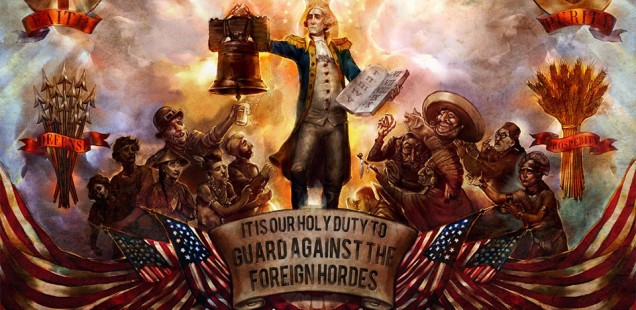
Is It Ist Or Is It Not?
On last year’s discussion of Bioshock Infinite.
December is the time of retrospectives, and over in our little corner of videogameland these come mostly in the shape of Game of the Year lists (with some exceptions), ranging from the very neatly sorted to the more open-ended. Apart from the tendency of outlets to declare an overall winner of the respective year and the tendency of commenters to bash each other’s heads in over disagreements in taste (both big parts of the tradition, admittedly), I tend to enjoy these writeups quite a bit. Partly for the joy of seeing a variety of games lauded for a variety of reasons, partly for getting some hints as to what missed gems I’ll want to pick up when my restraint inevitably fails during Winter Valvemas and partly because I have a memory like a sieve and actually need to be reminded what games came out in a particular year: I know what year it is and I know what games I enjoyed, but I never seem to associate one with the other. I liked Spec Ops: The Line, was that in 2013? No, can’t have been, I picked it in 2012.
One of the less enjoyable aspects of award season is that it tends to reheat the debates and controversies associated with certain picks, exemplified this time by the issues of racism and ludonarrative dissonance in Bioshock Infinite. I first noticed the rebooted arguments when Jim Sterling picked the game for one of his five awards. As is expected on such an occasion, he spent the majority of the video showering it with praise, but also included a mocking aside about its stuck-up detractors, the pretentious intellectuals who won’t let him enjoy the game in peace. I felt like he didn’t do a very good job of representing the arguments made about Infinite’s violent content though, repeating his familiar spiel about how the game is about violence, and therefore no amount of bloody murder could possibly feel misplaced, no matter the justification or representation.
I still find this unconvincing and consequently found the tone of the video nasty and off-putting, but my response probably also shows that I still care more than I should about what people think of this game. But there’s always somebody a little more upset. Jeff Kunzler, whom you might remember from various angry posts on the subject, responded to the prospect of more praise for Infinite with another broad attack on the state of games journalism in general, as well as Ken Levine, creator of Infinite, specifically.
Part of my problem with this post is that it’s, again, claiming to have things to say about the state of games journalism as a whole, while attacking a specific and misrepresentative sample. I tend to approach games with a Cultural Studies perspective, so my point of view is that anything and everything is interesting to consider, but it also needs to be put into perspective. It’s interesting what the big sites, your Polygons and IGNs and Kotakus, are saying about a game. It’s also interesting to consider why these sites are so big and influential, and how having reached that critical mass affects their perspective, but at a certain point, obsessing over their importance turns discussions of games journalism into No True Scotsman arguments. True games journalism is terrible/vapid/number-based/whathaveyou. This piece you linked me to isn’t. Therefore it’s not true games journalism.
This is something I’d like to expand on in another article, as a follow-up to the argument I made in Citizen Bane: Just like the games with the biggest budgets and audiences don’t define this medium, the games writing outlets with the biggest budgets and audiences don’t define the conversation surrounding it. There are more people making games than ever before: crowdfunded indies, zinesters experimenting with Twine, students fiddling with GameMaker, whatever it is Zoe Quinn is doing. The same is true for games writing. There’s crowdfunded special interest magazines, essay collections, odd zines, blogs and Tumblrs, Youtubers dissecting indie titles and critics hitting it off on Patreon. Also, Haywire exists.
 Both games and games writing are going through an amazing explosion of creativity right now. That creates some problems of its own, as developers struggle to be noticed while writers work out how to deal with this overwhelming flood of games, but I maintain that these are glorious problems to have, and am planning many wonderful articles about this exciting future. One thing that’s already certain is that this mass of content has turned opinionating on the state of all of anything into a fool’s errand, and I know that because I’ve been doing it myself.
Both games and games writing are going through an amazing explosion of creativity right now. That creates some problems of its own, as developers struggle to be noticed while writers work out how to deal with this overwhelming flood of games, but I maintain that these are glorious problems to have, and am planning many wonderful articles about this exciting future. One thing that’s already certain is that this mass of content has turned opinionating on the state of all of anything into a fool’s errand, and I know that because I’ve been doing it myself.
People are making general arguments based on specific examples, and all they’re achieving is maintaining the self-fulfilling prophecy of their significance. I can’t think of a single article about the state of games writing this year that would not have been significantly improved, or even revealed as fundamentally flawed and consequently abandoned, had the author spent a few hours poking around on Critical Distance. And I know from helping out there that Critical Distance still misses or skips a lot of articles in boiling things down to a palatable weekly list.
This is a very lengthy aside to make about the first two paragraphs of a post discussing racism, but this lack of perspective just makes the argument look incredibly self-absorbed. Kunzler writes this “[a]s one of the few people who has actually bothered to critically look at racism in Bioshock: Infinite”. Links to other articles, besides the two posts he quotes, need to be pointed out to him and edited in, and just off the top of my head, I’d add Anjin Anhut and Dan Golding to the list of people he missed.
I agree with Kunzler’s general assessment, and I can even see where the anger comes from. I know how frustrating this conversation can be. Condemning or ignoring his post based on tone alone is an icky thing to do, but the way he loses his head and any regard for nuance when talking about the subject is a problem, and I’m not sure who’d be inclined to listen at this point. When the game came out, he called Kirk Hamilton, Erik Kain, Benjamin Popper, Michael Abbott and, again, “the rest of mainstream games journalism” (at least that includes one modifier) “sick fucks” for talking about violence and not about racism, as if they had explicitly mentioned being fine with that aspect.
The interesting part? He’s right. Technically. The question of which aspects of a game are prioritized over others in discussing it critically is an issue, and collectively, we, all of games writing, are probably not paying enough attention to the problematic parts of our entertainment, despite a lot of individual pieces that do address them. It’s also true that any second I spend writing about other parts of a game, like mechanics or environmental design, is time not spent writing about issues of social justice. But framing it as this “If you’re not with me, you’re against me” divide is a very accusatory way of looking at it.
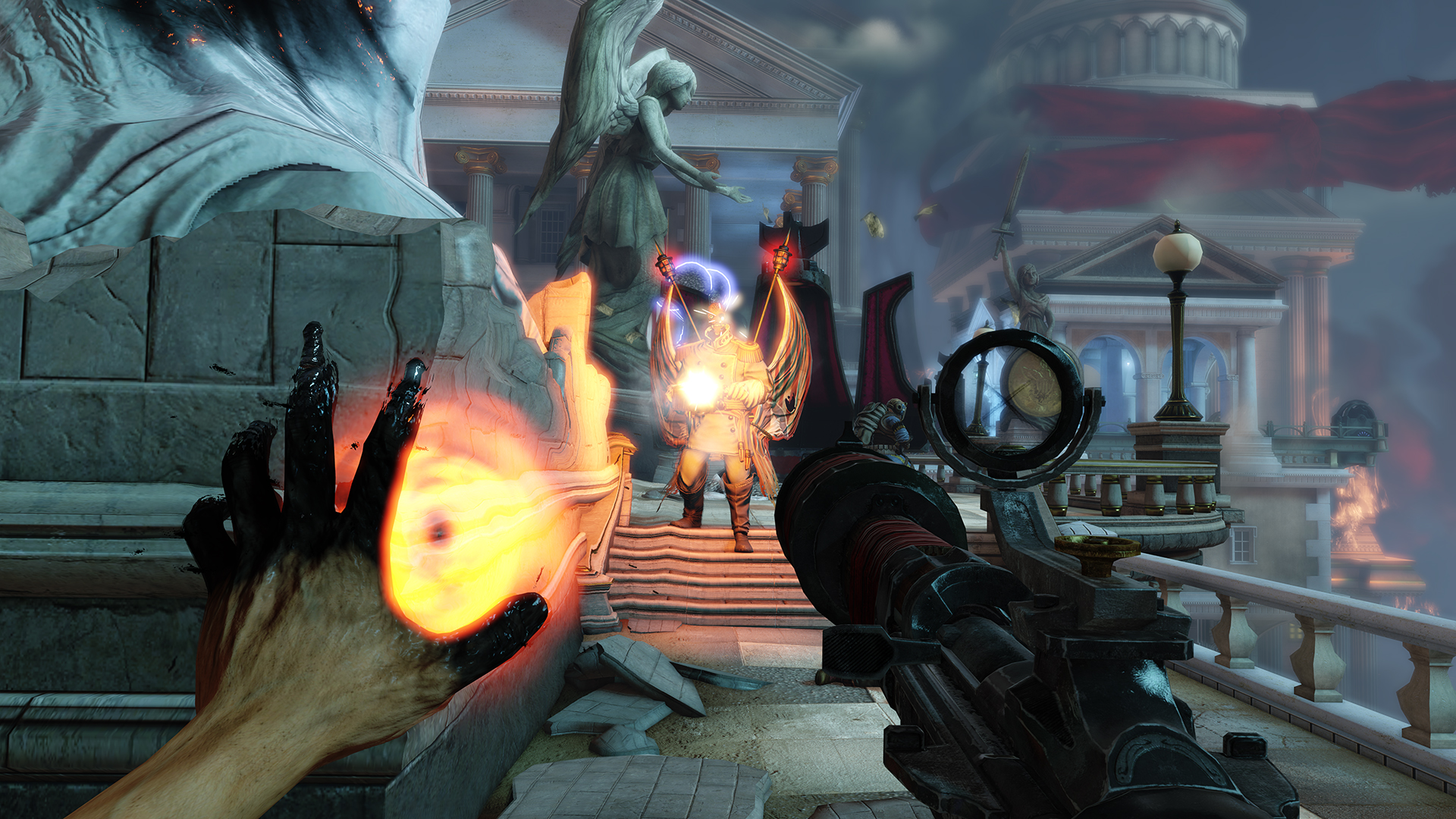 If you want to go down that road, any second spent writing about issues of social justice in relation to videogames is also time not spent writing about these issues in real life, which is time not spent writing about “larger issues”, which is time not spent actively “fixing” any of these. This kind of hierarchy of activism is based on the fallacy of relative privation, and is often put forth by people who consider supporters of a cause hypocritical if they don’t tear themselves to pieces in constant self-sacrifice and devotion.
If you want to go down that road, any second spent writing about issues of social justice in relation to videogames is also time not spent writing about these issues in real life, which is time not spent writing about “larger issues”, which is time not spent actively “fixing” any of these. This kind of hierarchy of activism is based on the fallacy of relative privation, and is often put forth by people who consider supporters of a cause hypocritical if they don’t tear themselves to pieces in constant self-sacrifice and devotion.
The thing about “You’re not doing enough!” is that it’s always true, no matter who you throw it at. Sometimes it’s because people are human, and need to eat or sleep every so often. Sometimes it’s because people are lazy, hesitant or unconvinced. Sometimes it’s because they are actively opposed to an idea. Yet the accusation tends to be made in ignorance of other people’s lives. I know I have a hard time taking it seriously coming from anonymous voices, who know nothing about how I do and don’t spend my time when I’m not writing, about the activities I don’t mention on Twitter. When, for all I know, their entire contribution might be not even doing this little thing I am being criticized for, but spending their time putting people down on the internet.
There’s an interesting and insidious double bind in uttering such criticisms: On the one hand, the idea that criticism needs to be tempered and sugarcoated before it can be taken seriously is demeaning to critics, but on the other hand, losing yourself in zealotry and righteous fury tends to be equally unhelpful. It brings you in the territory of generalizations about labels, and if you haven’t already, I encourage you all to read Mattie Brice’s Not A Monolith for an idea of how these can damage discussions of social justice by turning them into competitions or bullying matches (Update: Also read On Anger, which goes in a similar direction to this post, but regarding a more recent controversy).
It’s one thing to say that Infinite’s representation of oppression and revolution deserves critical attention, and quite another to say that anyone who isn’t discussing it themselves (regardless of whether they even talked about Infinite) secretly wants to return to a segregationist 1900’s Americana. One thing to suggest that certain aspects should be included when discussing unrelated topics, another to say that only a few topics are allowed coverage to begin with. I think that when the Games Journalism Prize shortlist arrived, Kunzler revealed himself to fall firmly into the latter camp. For him, this piece about Left 4 Dead failed for discussing player bonds and not mechanics. This article about the inclusion of gay romance options in Mass Effect 3 versus The Old Republic should really have been about the male gaze instead. And this one about Infinite’s Elizabeth, well, you can probably guess what it should have covered.
As the editor of all three, I have finally managed to become part of the problem. But I do think that all these were interesting subjects, and that there are parts of Infinite, the game I once called “a cowardly endorsement of centrism and political inertia”, that are worth discussing, beyond what it does or doesn’t have to say about racism. For me it was violence, for Andrew Walt it was mechanical boundaries, for Francisco Dominguez it was character and environmental design, and Andrew Huntly is currently working on a piece about labor and socioeconomic oppression (that’s a lie, he has actually finished it, I just haven’t gotten around to editing it). And now here I am finally getting around to discussing its content and message too.
(Note: I am aware of the irony of criticizing other people’s obsession with big titles and big outlets while running not one, but five articles on Bioshock Infinite of all things. More varied content is coming soon).
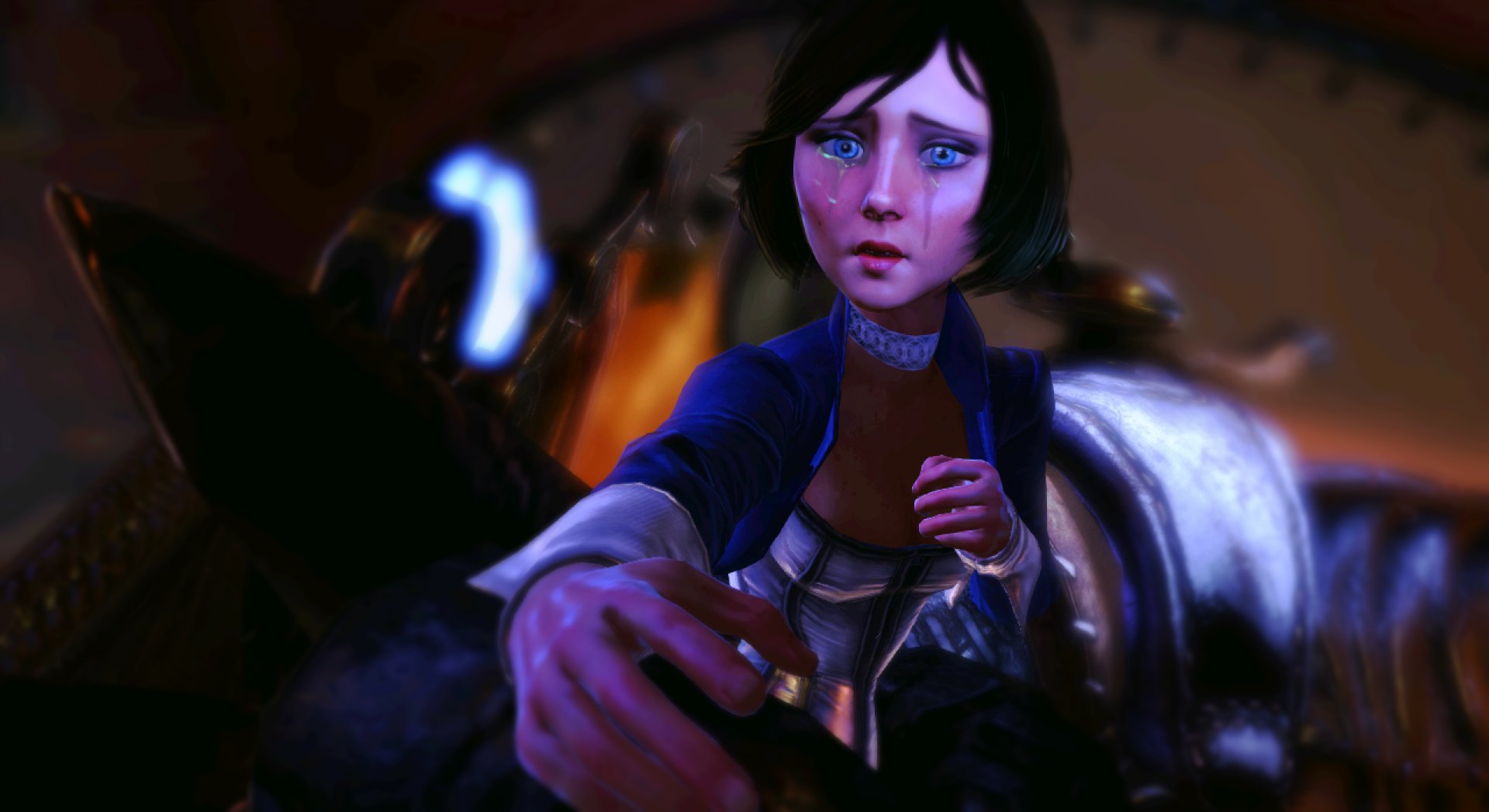 But back to Kunzler first: The problem with such an openly accusatory post that doesn’t have any room for nuance, is that it gives people something very convenient to latch onto and argue against, or to base their decision to leave a conversation on, which is doing the opposite of helping. What I’m not trying to say with this is that all accusations and all anger are ultimately unhelpful. There’s another entire article in people’s fear of social justice constituting censorship or enforcing beliefs, and its language being appropriated to defend bigotry, and whether it’s intolerant to be intolerant of intolerance, so you’ll have to take the short version for now.
But back to Kunzler first: The problem with such an openly accusatory post that doesn’t have any room for nuance, is that it gives people something very convenient to latch onto and argue against, or to base their decision to leave a conversation on, which is doing the opposite of helping. What I’m not trying to say with this is that all accusations and all anger are ultimately unhelpful. There’s another entire article in people’s fear of social justice constituting censorship or enforcing beliefs, and its language being appropriated to defend bigotry, and whether it’s intolerant to be intolerant of intolerance, so you’ll have to take the short version for now.
This issue is as much about people reacting defensively than it is about perceived attacks. It’s why Anita Sarkeesian needs to include a disclaimer about the limits of her critique and people being allowed to enjoy problematic content to at least try and appease angry gamers, but I’m pretty sure that in this case, talking about “a village of white, racist idiots, [Levine] being the biggest of them all”, insulting games journalists left and right and jeering at any piece not discussing the right topic contributed to the response.
Racism is a complex word, and there’s a lot of misconceptions and disagreements about its meaning. Dictionary definitions tend to concern themselves with the basics of racial essentialism and prejudice, but in discussions of social justice (and where else is the word ever used, really?) it has also come to denote the calcified systems and thought structures that have evolved from decades and centuries of viewing these arbitrary distinctions as natural. In other words, racism is not just actively making judgements based on the color of somebody else’s skin, it’s the sum of all injustices and inequalities that exist right now because of historical transgressions, oppressive systems and tacit assumptions.
It doesn’t require malice. It doesn’t even require intent. If it did, odds are it would be gone or at least severely diminished at this point, but part of what’s so sinister about racism (and also sexism, classism, homophobia, etc: Intersectionality is a good concept to be familiar with) is that a lot of its effects tend to be invisible when you’re privileged enough to not experience them. Racism isn’t limited to open hate crime and hate speech, it covers anything from structural and institutional inequalities to prejudice and the little, superficial assumptions people make daily, myself definitely included. It’s a very broad concept, but so are a lot of ideas in the English language. This is what specifiers were invented for: We might talk about the grossly racist, the openly racist, the ridiculously racist on the one hand, and the accidentally racist, the potentially racist, the slightly racist on the other hand. And in the absence of a specifier, context is always helpful for interpreting it.
When you talk about something they like or something they do being racist though, people tend to immediately read it as a personal attack, an interpretation that (usually) presents a fundamental misunderstanding of the criticism put forward. It assumes that racism exists only in historical extremes of persecution, which we are now past. It assumes that racism is a vice of the openly hateful, rather than something we are all a little guilty of, some of us more so than others. It assumes that racism is a character trait, and not a mode of thinking. It assumes that people are racist, not their words, acts, attitudes or art.
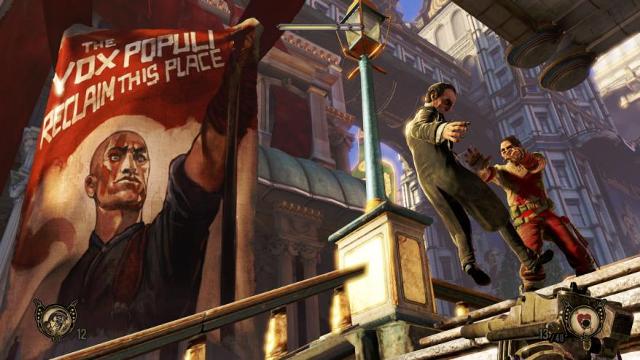 One thing you see in a lot of these discussions is that, when people don’t use the word “problematic” instead anyway, very rarely do they go so far as calling people racists. They might talk about content and concepts instead, or talk about somebody doing something racist, or of somebody being racist, momentarily (rather than being a racist). Often the first time it happens is when commenters in disagreement introduce themselves with the words “Now I’m no racist, but…”, typically followed by nothing worth reading. It’s as ineffectual as saying “No offense” when you really mean “Fuck off”, but also shows the need people feel to distance themselves from that inexcusable blemish, that permanent mark upon their person that the idea of being found guilty of racism presents to them (All of this still applies to similar isms).
One thing you see in a lot of these discussions is that, when people don’t use the word “problematic” instead anyway, very rarely do they go so far as calling people racists. They might talk about content and concepts instead, or talk about somebody doing something racist, or of somebody being racist, momentarily (rather than being a racist). Often the first time it happens is when commenters in disagreement introduce themselves with the words “Now I’m no racist, but…”, typically followed by nothing worth reading. It’s as ineffectual as saying “No offense” when you really mean “Fuck off”, but also shows the need people feel to distance themselves from that inexcusable blemish, that permanent mark upon their person that the idea of being found guilty of racism presents to them (All of this still applies to similar isms).
It’s a bit like saying that when people observe that speeding or recreational drug use are illegal, they are also calling these things just as bad as murder, because that’s a thing which is also illegal. This narrow view of what racism and similar isms are is a huge issue in trying to discuss their effects. To his credit, Kunzler makes the same point in the course of his post, although I find he’s having a hard time arguing that immediately interpreting any mention of the subject as a personal accusation is limiting our understanding of the concept while also doing just that. And yet, on the other hand…
Getting angry might often be unhelpful, but it’s also an understandable reaction to these issues. In the game of making these discussions about tone rather than content, getting personal might provide ammunition to detractors, but it’s taking criticism of beloved games personally that irks me far more. I feel like I shouldn’t have to point out how silly it is: I’m not criticizing Infinite out of a misguided notion of moral superiority any more than you are liking it because you secretly hate anyone of a less than milky white complexion.
Yes, this has been insinuated, and that was also silly. Somehow I suspect the reaction did not depend on a single article though, seeing as backlash to criticism of adored franchises is common enough to count as a force of nature in videogameland, from the headbashing in comment sections, to the petitions and the really nasty harassment reserved for traitors like Sarkeesian. It’s astonishing to me how widespread this defensive attitude is. Whether responding to real attacks or perceived ones, it seems a lot of people are committed to the idea of fighting back against criticism.
(Note: You might be thinking at this point that I’m unfairly indicting people based on the actions of a tiny fraction, since most self-described gamers don’t sign these, don’t troll people, don’t make Flash games about beating critics up. The truth is that defensiveness, too, works on a broad spectrum, and instead of reading this as an attack on gamer culture, I’d like you to instead consider how your opinion of a game colors your response to criticism. I can get a bit irrational when it comes to that)
The idea that criticism needs to pass a minimum requirement for niceness and respectful treatment of source material is preposterous to me. It shackles the conversation to the people least willing to have it, bringing us right back to the territory of disclaimers about enjoying problematic content, as if criticism needs to fall over itself to remind readers it presents “just an opinion”, which to some people seems to spell “feel free to disregard this without considering the supporting arguments, your uninformed perspective is just as valid, really”. Once again, there’s another entire article in this, but that’s not how interpretation works, and that’s not what plurality of opinion means. And I’ll also refer you back to the earlier hypothetical article about social justice being forced on people.
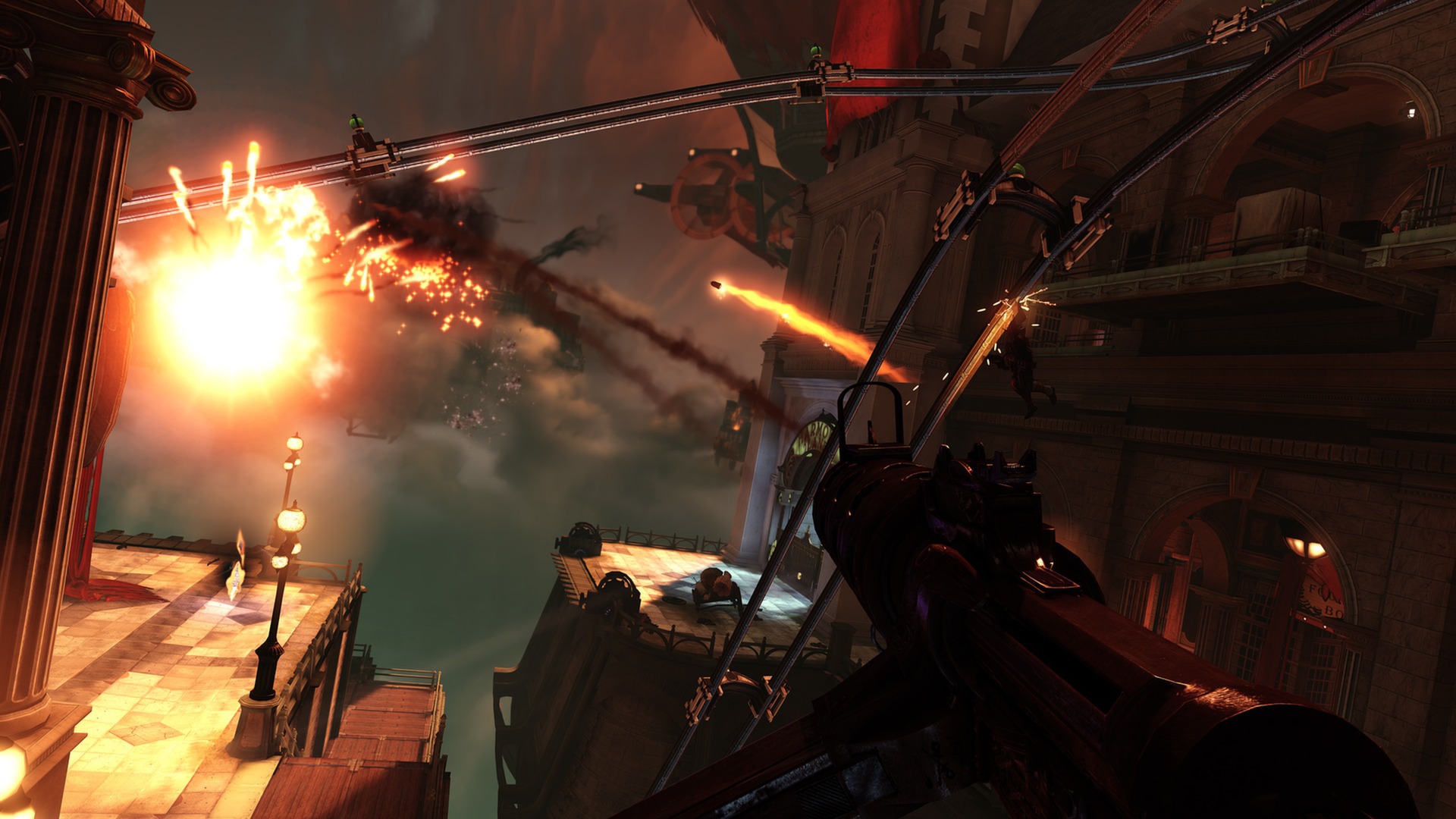 Given all those hypotheticals, perhaps it’s time to finally bring this around to the game itself, before I spend another thousand words theorizing on how those discussions should work instead of actually having one. So, to bring us up to speed here’s where I stand on the subject: I think Bioshock Infinite is pretty damn racist, on multiple levels. There’s the usual, almost expected continuation of dominant representations because of marketing logic, being another perfect example of the trend of exclusively focusing on white protagonists and eternally relegating anyone else to the role of sidekick or, in this case, antagonist. Which is to say it is a bit problematic on the level of not going above the established baseline of societal racism.
Given all those hypotheticals, perhaps it’s time to finally bring this around to the game itself, before I spend another thousand words theorizing on how those discussions should work instead of actually having one. So, to bring us up to speed here’s where I stand on the subject: I think Bioshock Infinite is pretty damn racist, on multiple levels. There’s the usual, almost expected continuation of dominant representations because of marketing logic, being another perfect example of the trend of exclusively focusing on white protagonists and eternally relegating anyone else to the role of sidekick or, in this case, antagonist. Which is to say it is a bit problematic on the level of not going above the established baseline of societal racism.
More importantly, it goes above and beyond that minor complaint by claiming to have something to say on the matter of racism and then never following up on that promise, worse, abandoning it to focus on the quantum entanglement of Columbia’s royal family, effectively appropriating slavery and segregation as set dressing and shorthand for characterizing Columbia’s inhabitants as evil. Worse still, the only message about racism it seems to offer is the aforementioned “cowardly endorsement of centrism and political inertia”.
By having the populist revolution in the game go wrong, and having its leader and the only notable black character in the game, Daisy Fitzroy, go mad with power and revenge, it creates a false equivalence between institutionalized violence and oppression on the one hand, and revolution and resistance on the other. Racism might be bad, but fighting back? That kills children, as Fitzroy would, face painted red with the blood of her oppressors. “Is this your movement?”, Booker asks mockingly, but the game isn’t interested in her or her revolution at this point. Elizabeth needs to wash away her innocent naivete and starry-eyed idealism with blood, stabbing Daisy in the back to save the kid. Her corpse is merely a stepping stone in the white main character’s passage into cynical adulthood.
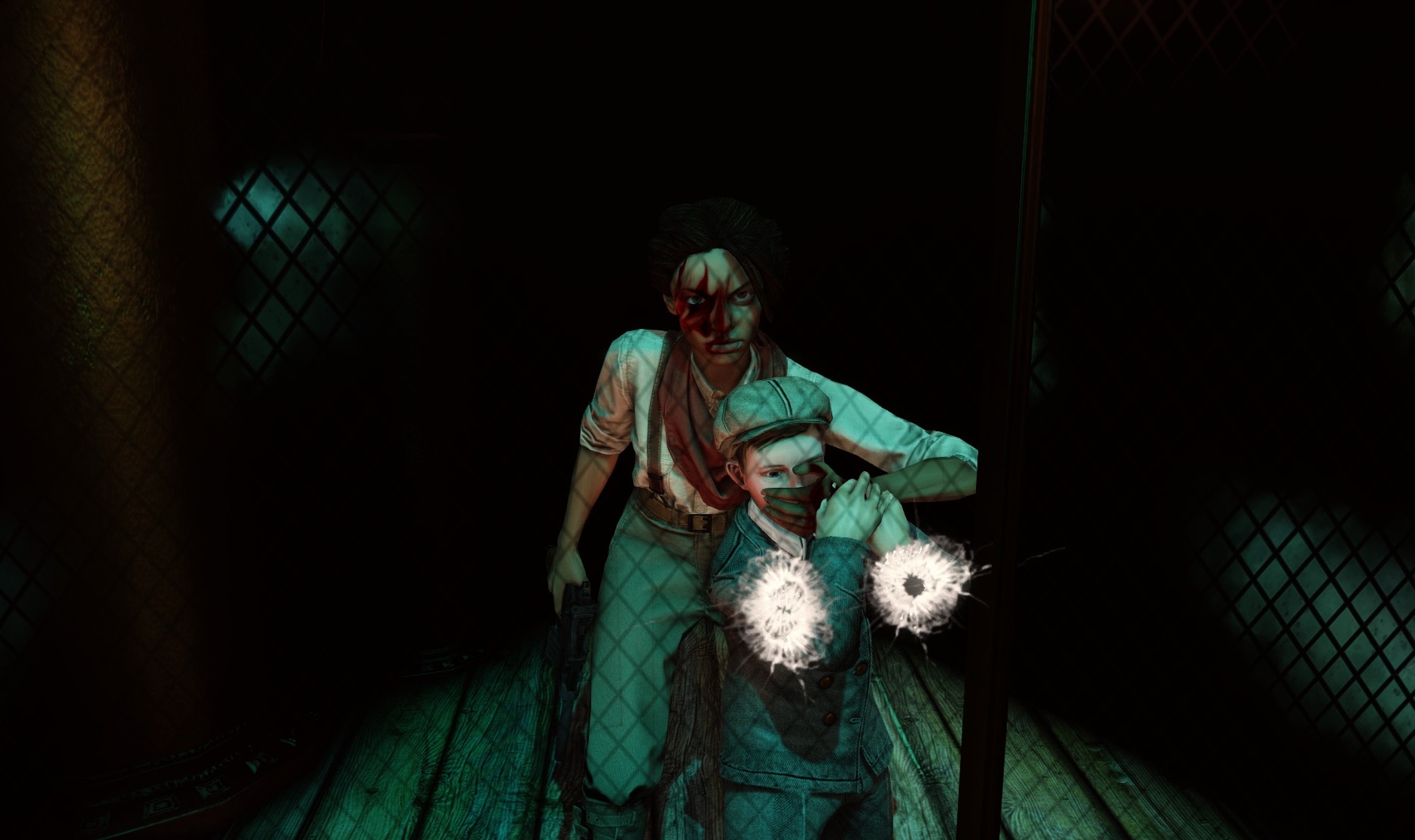 There are other interpretations of course, but I can’t say to see a lot of sense in the arguments made to support them. One frequent contender is that Daisy Fitzroy does not represent the revolution in its entirety (and it’s racist in itself to suggest that), but then at no point in the game are the two shown to be independent of each other. When Fitzroy tells her troops to kill Booker, their folk hero, because he “complicates the narrative”, they immediately open fire. Perhaps I missed an audiolog or two, but I don’t recall ever meeting a revolutionary who disagreed with this rather extreme order. Whatever their own views may be, from this point on, just like Columbia’s soldiers, the revolutionaries become an indistinguishable mass of enemies, going through extreme lengths to kill you, with virtually no regard for their own safety.
There are other interpretations of course, but I can’t say to see a lot of sense in the arguments made to support them. One frequent contender is that Daisy Fitzroy does not represent the revolution in its entirety (and it’s racist in itself to suggest that), but then at no point in the game are the two shown to be independent of each other. When Fitzroy tells her troops to kill Booker, their folk hero, because he “complicates the narrative”, they immediately open fire. Perhaps I missed an audiolog or two, but I don’t recall ever meeting a revolutionary who disagreed with this rather extreme order. Whatever their own views may be, from this point on, just like Columbia’s soldiers, the revolutionaries become an indistinguishable mass of enemies, going through extreme lengths to kill you, with virtually no regard for their own safety.
Fitzroy says jump, the Vox Populi jump. I don’t see why you’d assume there’s a meaningful difference between the two, when nothing in the game supports that. It may be true that Booker only compares the respective leaders, but in the absence of a more nuanced comment on the actual factions, or of a more nuanced portrayal of both groups, how is it nonsensical to read this as a comparison of the two sides? Because there’s another message here that the game just doesn’t show in any way? You work with what you have.
This also applies to the suggestion that Daisy Fitzroy only turns evil because of the injustices inflicted upon her, which must surely make her character an effective critique. The problem is that while the game does describe the abuse she suffers, it never really comments on how this might make her a more sympathetic character, and her eventual downfall more understandable. That’s obviously how we interpret the situation, but the only thing the game says on the matter is still Booker’s comparison: “When you get down to it, the only difference between Comstock and Fitzroy is how you spell the name”. And when you keep in mind Infinite’s big twist, the game actually spends a lot more time giving you sympathetic backstory on Comstock than it does for Fitzroy.
Another one is that Infinite is merely talking about extremist ideologies. The original Bioshock was about extremist libertarianism, and Bioshock Infinite now is about extremist racism and extremist anti-racism respectively. It’s not saying that fighting racism is a bad, just that there is such a thing as taking it to far. Apart from the fact that this is the safest comment you can possibly make about any controversial issue, hence why I called it cowardly, doesn’t that mean that Infinite, by the same line of reasoning, is also not saying that racism is bad, just that there is such a thing as taking it too far?
More realistically, do you really think you can comment exclusively on the extreme version of something without also talking about the thing itself? South Park is not just making a hilarious guffaw by exaggerating any ideology to the point of absurdity and trying to reveal it as hypocritical by targeting the personality and past of anybody who holds a strong opinion on the subject. By punching in every direction and arguing that the flaws inherent in any movement and any person ultimately make them equal, equally silly that is, it’s also tacitly endorsing the current order of things, since any attempt to upset it is shown to be ill-advised, misguided and ultimately pointless.
It’s sometimes suggested that this is an apolitical position, a kind of D&D ideal of true neutrality, but such an ivory tower position of taking yourself out of the game does not exist. “Apolitical” is in itself a political stance, one that favors established conventions and parties, which don’t need your support, by withholding it from those who do. By not voting, by not taking part in the discussion, by prioritizing painting revolutionary doomsday scenarios over taking a stance, by going “Well, but…” and waxing on about the fuzziness of such issues, about hypothetical limits and hypothetical transgressions, you’re making a decision to not change things by tacitly supporting the status quo.
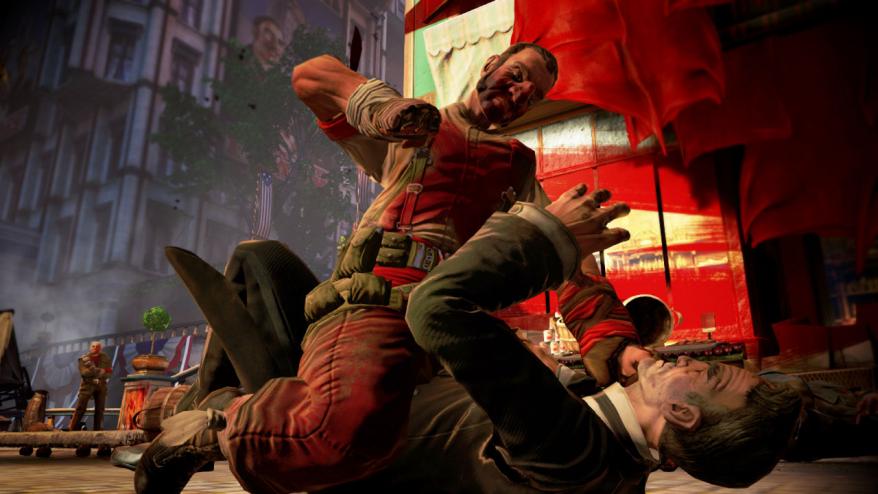 My interpretation of Infinite is that its extremist conservative and liberal factions represent their moderate counterparts, which are conspicuously absent. But even if I could accept that the game somehow managed to only talk about the most ridiculous form of either side, that it would sooner pit those two against each other than saying anything more meaningful, more real, about the historical period it picked up and then abandoned seems messed up. Intentional or accidental, the fact that the only version of this revolution that exists in the game (which, mind you, already had the plot contraptions in place for showing multiple versions of it) is this violent militant debacle is loaded with meaning.
My interpretation of Infinite is that its extremist conservative and liberal factions represent their moderate counterparts, which are conspicuously absent. But even if I could accept that the game somehow managed to only talk about the most ridiculous form of either side, that it would sooner pit those two against each other than saying anything more meaningful, more real, about the historical period it picked up and then abandoned seems messed up. Intentional or accidental, the fact that the only version of this revolution that exists in the game (which, mind you, already had the plot contraptions in place for showing multiple versions of it) is this violent militant debacle is loaded with meaning.
Perhaps my biggest complaint with these responses is that they don’t respond to other people’s criticism at all, and instead detail how to interpret Infinite along some other line. “Nothing at all to do with race” says Cheong about the presence of Fitzroy. “Sometimes a character is just a character” says Sterling. However, the opposite of being racist isn’t some magical state of “not about race”, it’s being progressive, but what I tend to see is people arguing that the game is simply about something else entirely. This doesn’t invalidate the existing interpretation, it adds another one.
That’s fine. I spent a good part of this post arguing that it’s fine that we’re soon going to have five of them here. Only if you want to have a conversation about a specific read, don’t tell people that their personal experience with a game is wrong or suggest that they are making it about something which it’s not about, even though it says it is and contains all the necessary parts. Instead, try telling me why Bioshock Infinite actually has something more enlightened to say on the subject of racism than I and a lot of other people gleaned from it. I don’t need to hear what you think it’s really about.
I also don’t need to hear why the game is the way it is. I know that making such a big project might involve cutting parts, and that the hastily wrapped up revolutionary subplot might have been the unfortunate victim of circumstance in production. I know the marketing logic, and why it’s Booker on the cover and not Elizabeth. I know why Booker looks the way he looks. There are reasons for all this. There’s always reasons for all this: the dominance of specific representations is made up entirely of a whole lot of individual examples, all with their own specific story of why it couldn’t have been any other way, the specific and sacrosanct vision of some creator. The question is not if there’s a reason for why things are the way they are, but whether the reason is good enough. I don’t think it is.